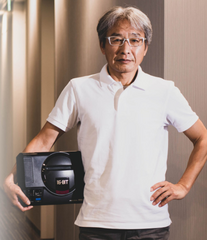Difference between revisions of "Masami Ishikawa"
From Sega Retro
m |
|||
| Line 10: | Line 10: | ||
{{stub}}'''{{PAGENAME}}''' (石川 雅美) is a Japanese engineer and developer. He joined [[Sega]] in 1979, initially becoming a part of the [[Sega Production and Engineering Department]] for amusement machine engineering.{{ref|https://web.archive.org/web/20190716084701/https://prtimes.jp/main/html/rd/p/000001184.000005397.html}} He then moved to the home console R&D division, developing all major consoles released by the company in the 80s and playing a crucial role in the design of the [[Mega Drive]].{{magref|harmony|130|18}} | {{stub}}'''{{PAGENAME}}''' (石川 雅美) is a Japanese engineer and developer. He joined [[Sega]] in 1979, initially becoming a part of the [[Sega Production and Engineering Department]] for amusement machine engineering.{{ref|https://web.archive.org/web/20190716084701/https://prtimes.jp/main/html/rd/p/000001184.000005397.html}} He then moved to the home console R&D division, developing all major consoles released by the company in the 80s and playing a crucial role in the design of the [[Mega Drive]].{{magref|harmony|130|18}} | ||
| − | The early 1990s saw Ishikawa return to amusement development, re-joining what had now became [[Sega AM4]].{{ref|https://web.archive.org/web/20150204030747/https://www.polygon.com/features/2015/2/3/7952705/sega-genesis-masami-ishikawa}} Despite continuing to accumulate considerable experience in successful products and hardware; he did not take higher profile positions alongside his former colleagues, instead tending to stay behind the scenes and develop arcade boards including the [[Sega Titan Video]] and [[Hikaru]].{{ref|https://web.archive.org/web/ | + | The early 1990s saw Ishikawa return to amusement development, re-joining what had now became [[Sega AM4]].{{ref|https://web.archive.org/web/20150204030747/https://www.polygon.com/features/2015/2/3/7952705/sega-genesis-masami-ishikawa}} Despite continuing to accumulate considerable experience in successful products and hardware; he did not take higher profile positions alongside his former colleagues, instead tending to stay behind the scenes and develop arcade boards including the [[Sega Titan Video]] and [[Hikaru]].{{ref|https://web.archive.org/web/20160519140208/https://sega.jp/topics/160513_soft_1/}} |
He remained as a veteran of Sega R&D up to the late 2010s, briefly moving from AM4/[[Mechatro]] successor [[Product R&D]] to the short-lived [[N. Pro. R&D]] team{{ref|https://web.archive.org/web/20130818192544/https://www.famitsu.com/news/201308/12038274.html}} and participating in interviews concerning his work on the Mega Drive in ''[[Sega Mega Drive/Genesis: Collected Works]]'' and ''[[Famitsu]]''.{{ref|https://web.archive.org/web/20181030160433/https://www.famitsu.com/news/201810/30166747.html}} | He remained as a veteran of Sega R&D up to the late 2010s, briefly moving from AM4/[[Mechatro]] successor [[Product R&D]] to the short-lived [[N. Pro. R&D]] team{{ref|https://web.archive.org/web/20130818192544/https://www.famitsu.com/news/201308/12038274.html}} and participating in interviews concerning his work on the Mega Drive in ''[[Sega Mega Drive/Genesis: Collected Works]]'' and ''[[Famitsu]]''.{{ref|https://web.archive.org/web/20181030160433/https://www.famitsu.com/news/201810/30166747.html}} | ||
Revision as of 20:16, 5 May 2022

|
| Masami Ishikawa |
|---|
| Company(ies): Sega of Japan |
| Role(s): Engineer |
This short article is in need of work. You can help Sega Retro by adding to it.
Masami Ishikawa (石川 雅美) is a Japanese engineer and developer. He joined Sega in 1979, initially becoming a part of the Sega Production and Engineering Department for amusement machine engineering.[1] He then moved to the home console R&D division, developing all major consoles released by the company in the 80s and playing a crucial role in the design of the Mega Drive.[2]
The early 1990s saw Ishikawa return to amusement development, re-joining what had now became Sega AM4.[3] Despite continuing to accumulate considerable experience in successful products and hardware; he did not take higher profile positions alongside his former colleagues, instead tending to stay behind the scenes and develop arcade boards including the Sega Titan Video and Hikaru.[4]
He remained as a veteran of Sega R&D up to the late 2010s, briefly moving from AM4/Mechatro successor Product R&D to the short-lived N. Pro. R&D team[5] and participating in interviews concerning his work on the Mega Drive in Sega Mega Drive/Genesis: Collected Works and Famitsu.[6]
Production history
- Othello Multivision (1983)
- Pioneer TV Video Game Pack SD-G5 (1983)
- SG-1000 II (1984)
- Sega Mark III (1985) — Team Leader
- Sega Master System (1986) — Team Leader
- Sega Mega Drive (1988) — Team Leader
- Sega Teradrive (1991) — Team Leader
- Sega Titan Video (1994)
- Sega Hikaru (1999)
Photographs
- Main article: Photos of Masami Ishikawa
External links
- "SEGA CONSUMER 30th ANNIVERSARY BOOK" Mega Drive Edition / Mr. Ishikawa, who worked on the development, looks back on those days! interview with Famitsu at famitsu.com (Japanese)
- HOW SEGA BUILT THE GENESIS - excerpt from Sega Mega Drive/Genesis: Collected Works at Polygon
- The Man Who Created the Guts of the Mega Drive - English translation of 2018 Weekly Famitsu interview at One Million Power
References
- ↑ https://prtimes.jp/main/html/rd/p/000001184.000005397.html (Wayback Machine: 2019-07-16 08:47)
- ↑ Harmony, "1994 8" (JP; 1994-08-01), page 18
- ↑ https://www.polygon.com/features/2015/2/3/7952705/sega-genesis-masami-ishikawa (Wayback Machine: 2015-02-04 03:07)
- ↑ https://sega.jp/topics/160513_soft_1/ (Wayback Machine: 2016-05-19 14:02)
- ↑ https://www.famitsu.com/news/201308/12038274.html (Wayback Machine: 2013-08-18 19:25)
- ↑ https://www.famitsu.com/news/201810/30166747.html (Wayback Machine: 2018-10-30 16:04)